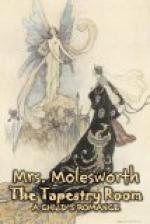They looked at each other curiously when at last they met. Jeanne’s eyes were sparkling and her cheeks burning, and her whole little person in a flutter of joyful excitement, and yet she couldn’t speak. Now that the little cousin was there, actually standing before her, she could not speak. How was it? He was not quite what she had expected; he looked paler and quieter than any boys she had seen, and—was he not glad to see her?—glad to have come?—she asked herself with a little misgiving. She looked at him again—his blue eyes were very sweet and gentle, and, tired though he was, Jeanne could see that he was trying to smile and look pleased. But he was very tired and very shy. That was all that was the matter. And his shyness made Jeanne feel shy too.
“Are you very tired, my cousin?” she said at last.
“Not very, thank you,” said Hugh. “I am rather tired, but I am not very hungry,” he added, glancing at a side-table where a little supper had been laid out for him. “I am not very hungry, but I think Nibble is. Might I have a little milk for Nibble, please?”
As he spoke he held up for Jeanne to see the small box he was carrying, and she gave a little scream of pleasure when, through the bars, she caught sight of the guinea-pig’s soft nose, poking out, saying as plainly almost as if he had spoken, “I want my supper; please to see at once about my supper, little girl.”
“Neeble,” cried Jeanne, “O my cousin, is Neeble your pet? Why, he is a ‘cochon de Barbarie!’ O the dear little fellow! We could not—at least papa and mamma could not—read what he was. And have you brought him all the way, my cousin, and do you love him very much? Marcelline, Marcelline, oh, do give us some milk for the cochon de Barbarie—oh, see, Marcelline, how sweet he is!”
Once set free, her tongue ran on so fast that sometimes Hugh had difficulty to understand her. But the ice was broken any way, and when, an hour or two later, Jeanne’s mother told her she might take Hugh up to show him his room, the two trotted off, hand-in-hand, as if they had been close companions for years.
“I hope you will like your room, cheri,” said Jeanne, with a tiny tone of patronising. “It is not very far from mine, and mamma says we can keep all our toys and books together in my big cupboard in the passage.”
Hugh looked at Jeanne for a moment without speaking. “What was that name you called me just now, Jeanne?” he asked, after a little pause.
Jeanne thought for a minute.
“‘Mon cousin,’ was it that?” she said. “Oh no, I remember, it was ‘cheri.’ I cannot say your name—I have tried all these days. I cannot say it better than ‘Ee-ou,’ which is not pretty.”
She screwed her rosy little mouth into the funniest shape as she tried to manage “Hugh.” Hugh could hardly help laughing.
“Never mind,” he said. “I like ‘cheri’ ever so much better. I like it better than ‘mon cousin’ or any name, because, do you know,” he added, dropping his voice a little, “I remember now, though I had forgotten till you said it—that was the name mamma called me by.”




